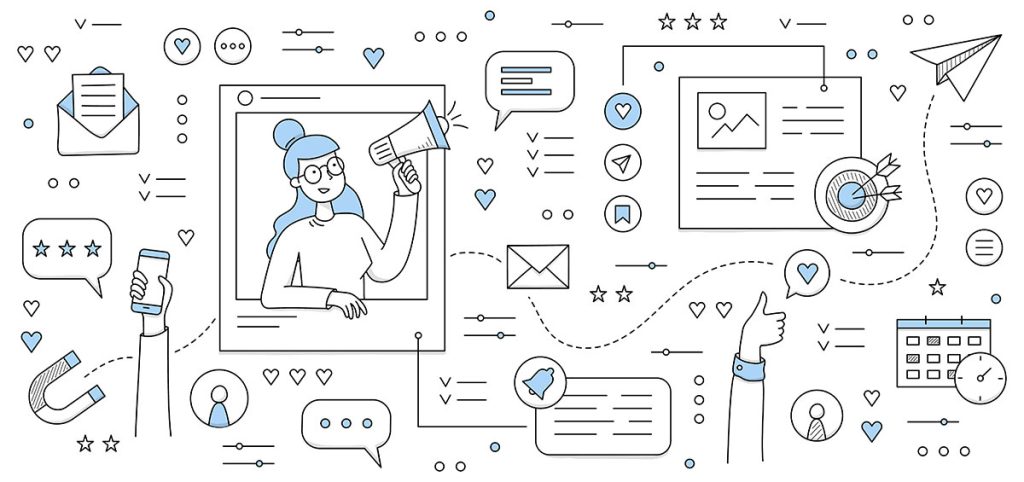In the digital age, consumers expect a seamless and consistent experience across all channels when interacting with businesses. This is where multichannel integration comes in, allowing businesses to provide a consistent and personalized experience to their customers across multiple channels. In this blog post, we'll explore key trends and best practices for omnichannel integration in 2023, with a particular focus on email marketing.
- What is Multichannel Consolidation?
- Why is it important to integrate all channels in 2023?
- Key trends in multichannel marketing in 2023
- How email marketing plays the most important role.
- Best practices for the implementation of multichannel marketing.
What is Multichannel Consolidation?
Multichannel Integration is the practice of integrating multiple channels, such as email, social media, SMS and physical stores, to provide a seamless and personalized experience for customers. The goal of multichannel integration is to create a consistent and uniform experience across all channels, allowing customers to interact with a business in the most convenient and comfortable way for them.
Why it is important to integrate all channels in 2023

In 2023, the integration of all channels will be more important than ever for businesses. With increasing competition in the digital landscape, businesses need to differentiate themselves by providing a superior customer experience. A seamless and personalized multichannel experience can help businesses create loyal customers, increase retention of their existing customer base, and increase revenue.
According to a study by Salesforce, the 84% of customers says that the be treated as an individual and not as a number, is very important to choose a business. Omnichannel integration allows businesses to treat their customers like individuals by providing a personalized experience across all channels.
Key trends in multichannel marketing in 2023
In 2023, we can expect to see several key trends in multichannel integration, such as:
- Personalisation with artificial intelligence: With the increasing use of artificial intelligence and machine learning, businesses will be able to provide even more personalised experiences to their customers. AI can analyze customer data from multiple channels to provide insights and recommendations for personalized messages and offers.
- Devices with voice search capability: With the growing popularity of voice search-enabled devices such as smart speakers and virtual assistants, businesses will need to optimize their strategy for voice search and similar commands.
- Sustainability: With increasing consumer awareness and concern for the environment, businesses should integrate sustainable practices into their multi-channel strategy. This could include minimising packaging and shipping waste, reducing energy consumption and using environmentally friendly materials.
- Data privacy: With the increasing focus on data privacy and security, businesses should be transparent about their data collection practices and give customers more control over their personal information. This will require businesses to implement secure data management and storage practices and clearly communicate their privacy policies.
- Interactive content: Interactive content, such as quizzes, polls and games, will continue to be a trend in omnichannel marketing, providing a fun and engaging way for customers to interact with a business through multiple channels.
How email marketing plays the most important role.

Email marketing is a key component of any successful multichannel integration strategy. Email allows businesses to deliver personalized and relevant content to their customers, increasing loyalty and engagement. In addition, email can be integrated with other channels, such as social media and SMS, to create a seamless and consistent experience for customers.
Here are some ways in which email marketing can be integrated into multichannel integration in 2023:
- Automated email campaigns: With the help of email automation tools, businesses can create automated email campaigns that are triggered by specific customer actions or behaviors. For example, a customer who abandons their cart on an e-commerce site could receive a personalized email reminding them to complete their purchase.
- Segmentation: Email marketing platforms allow businesses to segment their email list based on customer data, such as purchase history or loyalty level. These segments can then be synced with Google and Facebook audiences, allowing businesses to display targeted ads and messages across multiple channels.
- Personalization: Personalisation is key to a successful omnichannel integration strategy and email marketing provides an excellent opportunity to deliver personalised content to customers. By leveraging customer data and behavior, businesses can create highly relevant and engaging email campaigns that drive purchases.
- A/B Testing: Email marketing platforms also offer A/B testing capabilities, allowing businesses to test different email campaigns and strategies to see what works best for their audience. This data can then be used to optimize email campaigns and inform broader omnichannel marketing strategies.
Best practices for the implementation of multichannel marketing.
Here are some best practices for implementing a multichannel integration strategy in 2023:
- Focus on the customer: The customer experience should be at the heart of any omnichannel integration strategy. By understanding the customer journey and delivering a personalized and seamless experience across all channels, businesses can create loyal customers and increase revenue.
- Leverage data: Data is the foundation of any successful multichannel integration strategy. By collecting and analyzing customer data across channels, companies can gain insights into customer behavior and preferences and use this information to inform marketing and messaging strategies.
- Use of automation: Automation tools can help businesses save time and resources by automating repetitive tasks and creating personalised and relevant messages.
- Prioritise data privacy and security: With the increasing focus on data privacy and security, businesses need to ensure that they use secure data management and storage practices and that they clearly communicate their privacy policies to customers.
- Testing and optimisation: Testing and optimization is the key to success in any marketing strategy. By testing different campaigns and strategies and analyzing the results, businesses can continuously optimize their omnichannel integration strategy to improve the customer experience and drive results.
Conclusion
Multichannel Integration is a critical strategy for businesses seeking to improve the customer experience, increase sales and remain competitive in today's marketplace. By integrating all of their channels seamlessly and efficiently, businesses can deliver a consistent and uniform experience to their customers, regardless of how or where they choose to interact with them.
The advantages of integrating all channels go one level above customer satisfaction. It also allows businesses to gather valuable data and information that can inform marketing and sales strategies, improve inventory management and improve overall efficiency.
However, the implementation of omnichannel integration does not come without challenges and businesses must be ready to invest the necessary technology, training and infrastructure to operate effectively. In addition, businesses must also prioritise data privacy and security to ensure that customer information is protected across all channels.
Overall, the consolidation of all channels is an essential strategy for businesses that want to thrive in today's competitive and competitive marketplace.
If all of the above impressed you, ask us for a free email marketing consultation to show you how we help online businesses increase their revenue. Some examples you may have already seen in case studies Just book your seat with us.



